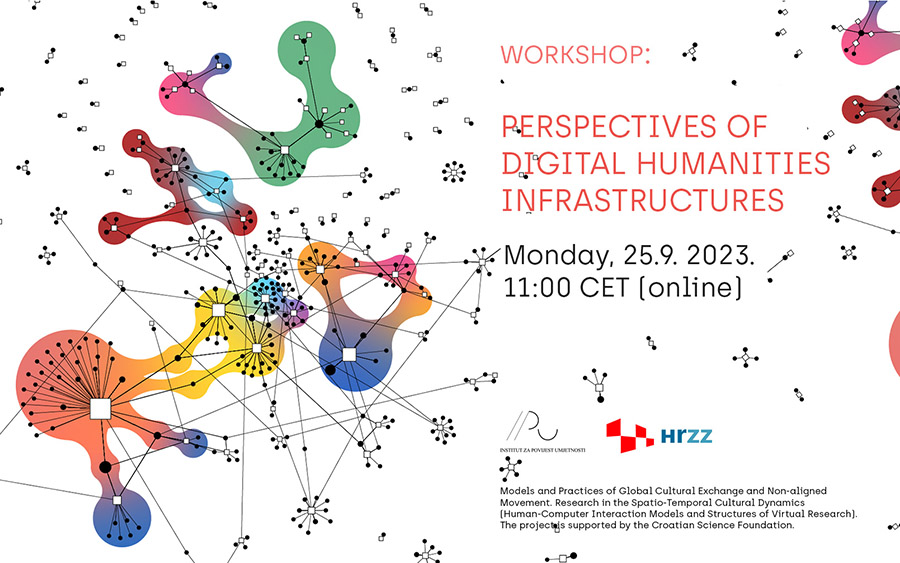Perspectives on digital humanities infrastructures
As we witness the growth of transnational digital humanities (DH) infrastructural initiatives, there is a persistent concern about the long-term perspectives and sustainability of these efforts. Due to differing goals, methodological outlines, data standards, technological progress, project and funding cycles – the sustainable perspectives of various DH platforms are often not adequately addressed and discussed. Focusing on DH infrastructures, the workshop will offer insights into the latest developments in the field presented by invited speakers.
The presentations will be followed by a discussion focused on several critical questions:
Perspectives of system design: How can we facilitate the transition from complete, robust DH systems to flexible modules and prototypes?
Perspectives of interoperability: How can DH data be reused, transferred, and preserved for its scientific and social relevance in the long run?
Perspectives of trust: How can we address the (in)compatibility of neural network workflows and the requests for provenance of cultural data in DH systems?
* Official language of the workshop is English. The workshop will be held online via Zoom: https://mit.zoom.us/j/99153407022 (Meeting ID: 991 5340 7022)
-
11:00
Introduction
Ljiljana Kolešnik (Institute of Art History, Zagreb)
Nikola Bojić (Academy of Fine Arts, Zagreb)
-
11:15
Development of the concept of e-trust
Hrvoje Stančić
Chair of Archival and Documentation Sciences / Vice-Dean for Organization and Development / InterPARES Trust AI project Executive Committee member
Department of Information and Communication Sciences, Faculty of Humanities and Social Sciences, University of Zagreb
The concept of trust in records will be discussed from the point of view of archival science. The transition to the digital records brought new challenges in the context of trustworthiness of the records. Their reliability, authenticity, and accuracy have become challenged by the volatility of the digital environment and fast technological progress. This was recognized back in 1998 when the InterPARES project was first funded. Over the course of 25 years and five succeeding and successful InterPARES projects the global multidisciplinary research network was established. The current InterPARES Trust AI project focusses on the usage of AI to carry out archival functions for the control in the long term of all records, on any medium, and from any age, and to do so in such a way that the trustworthiness of the records remains protected and verifiable, and that the tools and processes are transparent, unbiased, equitable, inclusive, responsible, and sustainable.
-
11:30
Enabling knowledge discovery as a means of data relevance
Artur Šilić
Director at Efficode Systems d.o.o., Zagreb
The projects ARTNET and Globe_EXCHANGE yielded CAN_IS – Croatian Artists Networks Information System – an extensive database of entities and their relations about the artistic networks in the 20th and 21st centuries. Also, the projects brought dynamic data visualization web modules. We will show a short demonstration of the database and its visualization interfaces and discuss how to keep the existing data relevant for interpretation within the digital humanities community.
-
11:45
Analyzing big visual data: challenges and perspectives
Nicola Carboni
Postdoctoral researcher –Visual Contagions project
Lecturer at the University of Geneva
In the history of representation, the illustrated press has been a major driving force, curating and disseminating ideas of visuality to artists and a wider audience. But how do we study the phenomenon? How can we use the digital to collect and process such a corpus? How can we organize it and make it reusable? How can we grasp the interaction and circulation of the visual at scale? To answer these questions, the presentation will introduce the pipeline, architecture, methods, and tools used by Visual Contagions. This project used IIIF to collect a corpus of illustrated periodicals published globally from 1890 to 1990. Using algorithms, we extracted pictures from their pages, compared them, and arranged them into clusters of image-types that we analyzed using data science and graph data science methods. In the presentation, we will briefly introduce the project and discuss the technological choices, the analytical methods employed, the interoperability of the data, and the sustainability issues faced by such a demanding infrastructure.
-
12:00 – 12:45
Discussion
Invited speakers (moderated by Nikola Bojić)
-
The workshop is conducted as part of final conference of the bilateral Croatian-Slovenian scientific research project Models and Practices of Global Cultural Exchange and Non-aligned Movement. Research in the Spatio-Temporal Cultural Dynamics (IPS2020-01-3992), under the project activity “Human-Computer Interaction: Models and Structures of Virtual Research”. The project is supported by the Croatian Science Foundation.
